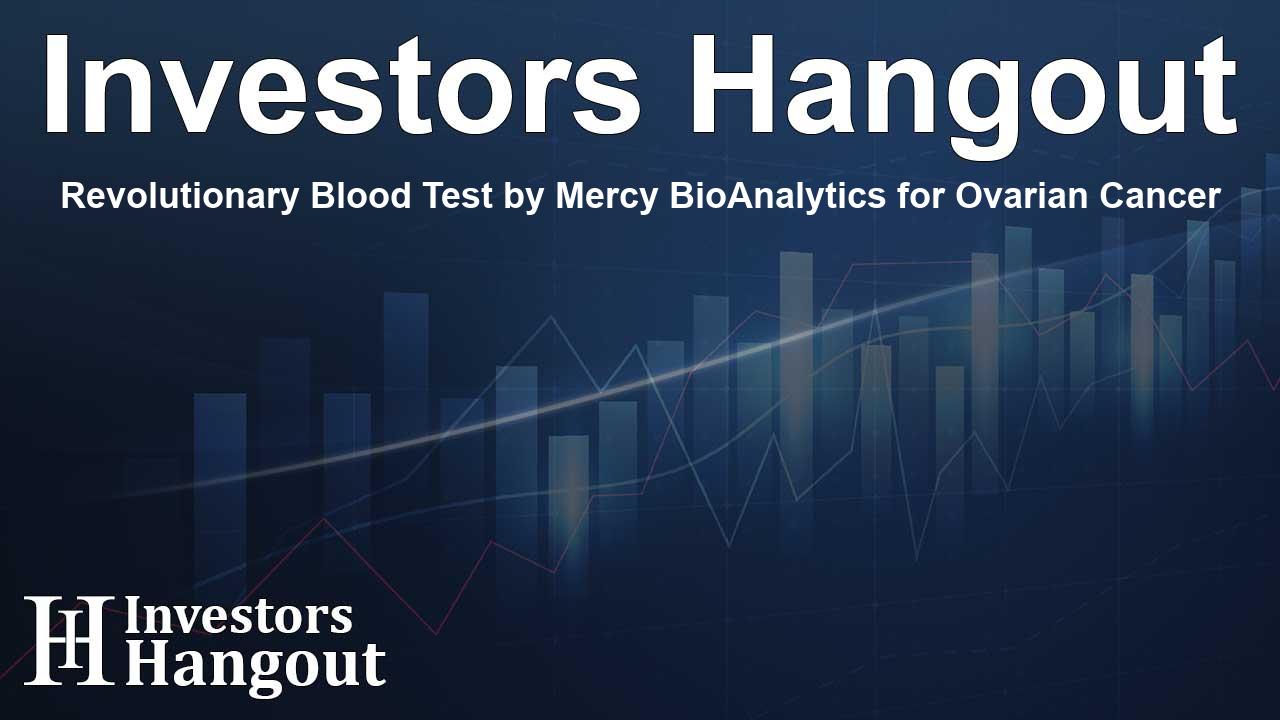Revolutionary Blood Test by Mercy BioAnalytics for Ovarian Cancer

Mercy BioAnalytics Unveils New Blood Test for Ovarian Cancer
The innovative blood test introduced by Mercy BioAnalytics, Inc. showcases an unprecedented ability to detect high-grade serous ovarian cancer in its early stages. This breakthrough represents a significant advancement in the field of gynecologic oncology, providing hope for better outcomes for women.
Groundbreaking Study Results
According to recent findings, the test achieved an impressive 89% sensitivity for identifying preclinical stage I/II ovarian cancer while maintaining a remarkable 98% specificity among average-risk postmenopausal women. This performance indicates a substantial improvement over traditional testing methods, particularly the CA125 test which has been commonly used in the past.
This validation study, published in the journal of Gynecologic Oncology, reflects ongoing research efforts by Mercy scientists in collaboration with experts from the Medical Research Council Clinical Trials Unit at University College London. The study serves as an essential step toward revolutionizing how ovarian cancer is detected.
Mechanism Behind the Test
The innovative assay developed by Mercy BioAnalytics identifies tumor-derived extracellular vesicles circulating in the blood. These vesicles deliver crucial information regarding cancer presence even in the most concealed preclinical stages. This early detection capability is vital as it allows for intervention during a period when treatment options may be most effective.
Addressing the Challenge of Ovarian Cancer
Ovarian cancer ranks among the leading causes of cancer-related deaths in women, with thousands of cases predicted to emerge annually. Alarmingly, a vast majority of diagnoses occur during late stages of the disease when the prognosis is considerably grim. Early detection, as demonstrated in current studies, could lead to a dramatic increase in survival rates, allowing nearly 90% of women to survive for ten years or more.
Mercy BioAnalytics is committed to changing the landscape of ovarian cancer diagnostics. The research highlights the feasibility of a blood-based approach to screening, which can significantly reduce false positives while ensuring timely and accurate identification of malignancies.
Experts Weigh In
Dawn Mattoon, Ph.D., CEO of Mercy, emphasized the importance of these findings, stating that, "This represents a watershed moment for noninvasive ovarian cancer screening. Nearly 90% sensitivity paired with 98% specificity is unprecedented in this domain, marking a transformative potential for early cancer detection brief addresses." The response of the medical community has been overwhelmingly positive, with many experts recognizing the urgency for more effective screening methods in gynecologic oncology.
Future Directions in Research
The findings pave the way for subsequent studies focused on validating the results within different populations and testing methodologies. Dr. Usha Menon, a leading figure in cancer research at UCL, anticipates the next phase of research to assess the performance of this test in a broader screening context.
This research is vital not only for patients but also for healthcare systems aiming to minimize mortality rates associated with ovarian cancer through early detection strategies.
About Mercy BioAnalytics
Mercy BioAnalytics is dedicated to advancing cancer detection technologies to enhance patient outcomes. Focused on both ovarian and lung cancers, their patented Mercy Halo™ liquid biopsy platform seeks to provide timely diagnoses to enable effective treatments, ultimately improving the lives of cancer patients and their families.
Frequently Asked Questions
What is the Mercy Halo™ blood test?
The Mercy Halo™ blood test is a novel liquid biopsy platform designed to detect early-stage ovarian cancer with high accuracy, demonstrating remarkable sensitivity and specificity.
How effective is the blood test in early cancer detection?
The test demonstrates an 89% sensitivity and 98% specificity for detecting high-grade serous ovarian cancer, making it a groundbreaking advancement for early screening.
Who conducted the validation study?
The validation study was conducted by researchers at Mercy BioAnalytics in partnership with the Medical Research Council Clinical Trials Unit at University College London.
What does this mean for women at risk of ovarian cancer?
This test holds great promise for women, particularly postmenopausal women, by allowing for earlier detection of ovarian cancer when treatment is most effective, potentially saving lives.
What are the next steps for Mercy BioAnalytics?
Moving forward, Mercy BioAnalytics aims to continue research on the test's efficacy across different populations and improve screening methods for ovarian cancer.
About The Author
Contact Logan Wright privately here. Or send an email with ATTN: Logan Wright as the subject to contact@investorshangout.com.
About Investors Hangout
Investors Hangout is a leading online stock forum for financial discussion and learning, offering a wide range of free tools and resources. It draws in traders of all levels, who exchange market knowledge, investigate trading tactics, and keep an eye on industry developments in real time. Featuring financial articles, stock message boards, quotes, charts, company profiles, and live news updates. Through cooperative learning and a wealth of informational resources, it helps users from novices creating their first portfolios to experts honing their techniques. Join Investors Hangout today: https://investorshangout.com/
The content of this article is based on factual, publicly available information and does not represent legal, financial, or investment advice. Investors Hangout does not offer financial advice, and the author is not a licensed financial advisor. Consult a qualified advisor before making any financial or investment decisions based on this article. This article should not be considered advice to purchase, sell, or hold any securities or other investments. If any of the material provided here is inaccurate, please contact us for corrections.
